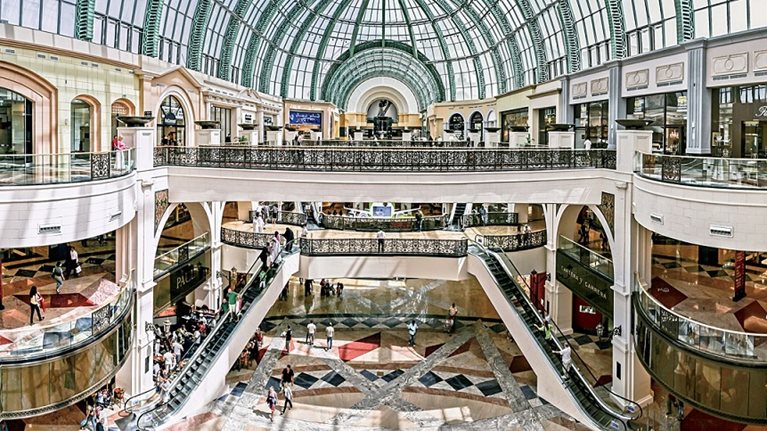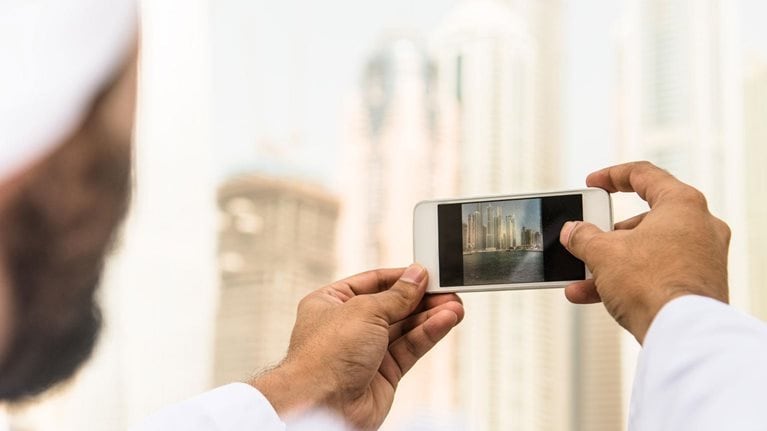In the summertime, temperatures in Dubai can exceed 40°C (104°F). No surprise, then, that people flock to the air-conditioned Mall of the Emirates to shop, dine, see movies, play arcade games, or . . . ski. Yes, this mall—located in the desert—houses Ski Dubai, the world’s largest indoor ski slope and snow park.
Stay current on your favorite topics
The Mall of the Emirates is owned and operated by Majid Al Futtaim Group, a conglomerate with a presence across the Middle East, Africa, and Central Asia. The leading developer and operator of shopping malls in the region, Majid Al Futtaim also owns VOX Cinemas, the Middle East’s largest movie-theater chain; several leisure and entertainment centers; and the Carrefour franchise in 38 countries. Since opening its first mall in 1995, the Group has doubled its revenues every five years, reaching approximately $8.2 billion in 2016.
For the past two years, Majid Al Futtaim has been led by Alain Bejjani, a lawyer by training, with a career spanning more than ten years within the Group. Bejjani recently spoke with McKinsey’s Peter Breuer and Gemma D’Auria in Dubai. Excerpts of the conversation follow.
McKinsey: Your businesses serve thousands of consumers every day. What are the biggest consumer trends you’re seeing?
Alain Bejjani: The most exciting global trend affecting all of our businesses is the shift in consumer focus from product to experience. Majid Al Futtaim has long been a pioneer in customer experience—partly because it’s extremely hot in the Middle East during the summer months, and it’s not unusual for people to spend the whole day at the mall! But they don’t want to just shop all day long, so we have turned our malls into social hubs and true “retail-tainment” destinations that address our customers’ wants, in line with our vision of “creating great moments for everyone, every day.” As our Mall of the Emirates tagline testifies, “Shopping is just the beginning.” And we are reinventing our assets all the time. Our ThEATre by Rhodes, for example, is a partnership between our VOX Cinemas and a celebrity chef. We’ve married movie viewing with gourmet food to create a completely novel experience.
In line with this trend of valuing experience over product, customers are even starting to define luxury differently. It is about truly enjoying the “great moments,” the experience, irrespective of the price point. ThEATre by Rhodes isn’t an exorbitant expense—just a premium on a regular movie ticket—but people see it as a luxury experience, and they love it because it is unique. People don’t want to just pay for luxury; they want to live it.

Another trend we see is that more consumers want technology to be seamlessly embedded into their experience. This is particularly true in the Middle East, which has some of the fastest growth rates in smartphone adoption, Internet penetration, online shopping, and social-media usage in the world. So we are embedding a technology dimension into everything we do. We’ve integrated our IT platforms and created a central repository for our customer data. We’re using technology to take our offering to a new level, and analytics to learn more about ourselves, our people, and our customers and make decisions that help us create great moments for them. We see technology as the currency of the future. And we’re working on establishing an online presence for our brands that will be as prominent as our offline presence, in particular, for our grocery retail business.
Another big trend is that disruption is no longer coming merely from our traditional competition but often from outside the boundaries of our specific industries. We need to make sure we not only look at the experience and technology of today but also constantly imagine and stay ahead of customer wants for the technology-enabled experience of tomorrow. This is where learning from other industries is tremendously helpful. We are learning from the world’s leading technology companies—Google, Facebook, Amazon, as well as great start-ups that are applying new approaches to solve real challenges.
McKinsey: Does that mean Majid Al Futtaim is starting to see itself as a technology company?
Alain Bejjani: Somewhat. Our overarching strategic thrust is to continue to be fit for purpose. That means we need to transform ourselves from a largely brick-and-mortar business into a technology-fueled enterprise, and do it in a way that keeps the customer at the heart of everything we do.
I believe retail has moved away from understanding our customers deeply, as clients, not just as a collective mass of consumers. We need to go “back to the future” and nurture an individual, personalized relationship with the customer, just like retailers used to do in the old days. But to do that today, we need data-driven insights and technology, as well as the right mind-sets in our people. These are, essentially, the pillars of our long-term strategic direction: unforgettable customer experience and globally competitive human capital, fueled by technology.
McKinsey: You defined your 25-year strategic direction just last year. Why was that an important exercise? Does it make sense to have a long-term plan in such a fast-changing retail environment?
Alain Bejjani: Like much of the corporate world, our horizon has always been defined in five-year rolling priorities. Yet I believe we are at a point where our decisions—about what we do, where we play, and how we earn the right to win—will be life-defining for our company. We simply cannot make such critical choices without a long-term strategic direction, a “North Star.” You have to be grounded in your fundamentals to sustain growth, particularly when you are a diversified and growing conglomerate, with 12 businesses at different stages in their life cycle. Otherwise, it is extremely easy, even tempting, to be derailed. As Lewis Carroll once wrote, “If you don’t know where you are going, any road will take you there.”
I have often said to our leaders that outperforming the competition should not be our endgame. The endgame is to fulfill our potential as an organization. Our 25-year strategic direction helps us to stay focused on that endgame.
McKinsey: One of your goals is for Majid Al Futtaim to have a stellar global reputation. What would you like to be known for?
Alain Bejjani: I’d like us to be known for leading by example and creating great moments. We don’t always do a good job in promoting our commitments and achievements. We are world-class in some aspects of our business and deserve to be a global benchmark in those. Take sustainability, for example. We recently launched a net-positive strategy: we will reduce our water consumption and carbon emissions so that we put more back into the environment than we take out, resulting in a positive corporate footprint by 2040. We are extremely proud to be the first company in the Middle East to commit to such a target; we’re proud to be part of a small group of corporates globally to “walk the talk” and have this strong commitment to sustainability.
So we have become much more deliberate in communicating our impact. I think this is increasingly important in a world that is much more instantaneous. We are also focused on establishing our thought leadership in specific topics that are core to our future and where we aspire to lead the way, such as customer experience and innovation.
McKinsey: You’ve now been CEO for about two years. Do you feel you’ve made any mistakes?
Alain Bejjani: By and large, I believe we’ve made the right strategic choices. But I think we could have done much better on two fronts: human capital and technology. In both of these areas, we are playing catch-up to globally competitive standards.
We were busy building a business but did not make our people center stage. Only recently have we started focusing on human capital as much as on financial capital. We cannot predict what capabilities we will need in the future; hence, we need to be globally relevant in order to attract top talent. Some of the most critical roles in the future have not even been created yet. So the only way forward is to instill an open and learning mind-set in our organization. We need to continuously reinforce ourselves as an organization where talented, ambitious people can thrive. This is very difficult to get right and to sustain. [Author and motivational speaker] Simon Sinek eloquently describes this in his book Start with Why. He explains that people don’t join an organization any more. Rather, they join a cause. Majid Al Futtaim’s cause is our vision of “creating great moments for everyone, every day.”
Similarly, technology in our company was always perceived as an enabler yet was never fully integrated into everything we do. We’ve now established our School of Analytics & Technology, with a curriculum that spans everyone in the company—from CEOs to frontline workers. I believe we are one of the few companies globally to have invested in analytical and digital capability building to such an extent.
So yes, we’ve made mistakes, but what is most critical is the ability to auto-correct, which is very hard without an open and learning mind-set. Instilling this mind-set in all of our people is a major challenge and the main reason we work so hard on our organizational culture. Our Leadership Institute is a milestone in our road map to become a learning organization.
McKinsey: Say more about the Leadership Institute. What is it, and how exactly is it helping you build capabilities?
Alain Bejjani: We established it two years ago, based on a leadership model that details the specific leadership behaviors we expect from our people, no matter their level of seniority (exhibit). We have dedicated significant time and effort to defining these behaviors and describing in detail what it means to meet, exceed, or fall short of expectations. We discuss our leadership model in each and every one of our town-hall meetings and we encourage everybody in the Group to use it when providing feedback. Since its launch, more than 9,000 employees have attended one or more of our programs in the Leadership Institute.

We take our top talent very seriously. We assess them rigorously on performance and potential, using a 360-degree tool, and we provide them with opportunities to lead. But we go beyond that—we proactively support our team members in their leadership and professional-development journey through an ongoing performance-management dialogue, designed to empower them to thrive in an ever-changing world. We invest in our people, and we’re willing to take risks on them. I am a great example of how the organization takes a risk on people. This is my first CEO role, and I feel tremendously privileged to have been given this opportunity.
In summary, we are striking a partnership with our team members to reflect our shifting philosophy—from financial capital being our most critical asset to human capital. Everything starts and ends there. I believe the “new normal”—this context of exponential change in which we live and work—is placing much higher demands on leadership. The implication is that financial capital will no longer be the limiting factor to growth or the catalyst to superior performance; the quality of human capital will be. I believe we have shifted from an era of capitalism to one of “talentism,” in which who attracts, develops, and retains the best talent wins. And what do I mean by “best talent”? It is quite simple—people with a growing and learning mind-set.
McKinsey: As CEO, how do you yourself learn?
Alain Bejjani: I enjoy learning through conversations, whether they are spontaneous or structured—meetings, lunches, coffee breaks. People who know me would tell you that I often evolve my thinking while brainstorming and discussing a particular issue. It is when I’m in stimulating conversations that I’m most able to generate new ideas, assess strategic choices, and push the boundaries of what’s possible.
Of course, I also measure myself against our leadership model. It’s tough to “hold up the mirror” and read through your own 360-degree feedback and acknowledge your own gaps and deficiencies. But this is precisely what is required if we are to embed a learning mind-set in the entire organization and a healthy approach to dealing with failure.
I actually decided to be bold and role-model transparency by sharing my 360-degree feedback with my team. One thing I need to work on, for example, is spending more time coaching people. I think this is a fair observation and a piece of feedback I am working on.
McKinsey: What’s the best leadership advice you’ve received since becoming CEO?
Alain Bejjani: I can think of three things that have resonated the most with me. The first is a French saying, “Give time to time.” It doesn’t translate well into English, but what it means is that there are just some things you cannot rush. In our company’s transformation, for example, I have found that you should communicate the case for change, then build evidence of impact to sustain the change, but also give time for people to absorb, internalize, and practice the change. We do that by promoting an open and trusting environment where people can voice their concerns and where no issue is allowed to fester.

Meeting millennials where they shop: Shaping the future of shopping malls
But this doesn’t mean “leave it to time” or “go slow”—in fact, I see it as one of the main responsibilities of my role to keep a sense of urgency and a fast pace in the organization. Change is more an art than a science. You need to use your judgment as a leader to figure out which parts of the organization can move faster than others and which ones need different types of intervention, and adjust accordingly. It is not a one size fits all.
Another quote I like is from Winston Churchill: “If you are going through hell, keep going.” It speaks to a quality I have a renewed appreciation for, which is grit—sticking with your long-term goals and persevering when things don’t work out exactly as you wish.
A third saying that I’ve taken to heart is, “It may not be your fault, but it is your problem.” You have to take full responsibility for your actions as well as for the actions of those you lead. I believe leaders need to overmanage, but not micromanage.
McKinsey: One final question: What are your sources of inspiration?
Alain Bejjani: I grew up in Beirut during the civil war. When I look back, I find that one of the many lessons from that experience is that one can achieve anything against all odds, if one really sets his heart and mind on it. In this regard, I am inspired by Mr. Majid Al Futtaim’s vision, his ambition to be world class, and his perseverance in keeping the long-term view.
Dubai is another great source of inspiration. The city that we call home was built in such a short time yet has defied the rules of economics and established itself as a true global destination. It is humbling to see how Dubai, which was endowed with very limited natural resources and could have easily remained a trading outpost at the edge of a vast desert, is trying to lead globally in transport, commerce, tourism, technology, responsive government, and even happiness. Majid Al Futtaim would not be the organization it is today if it had not been headquartered in Dubai.



